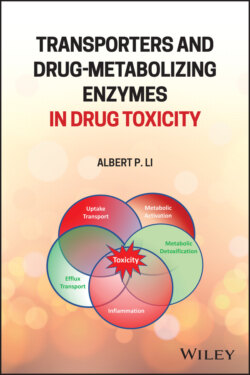Читать книгу Transporters and Drug-Metabolizing Enzymes in Drug Toxicity - Albert P. Li - Страница 38
2.5.4 CYP2C9
ОглавлениеGenetic variation in CYP2C9 has been recognized as a host factor for adverse drug reactions because many of the CYP2C9 substrates have a narrow therapeutic index [41]. The most studied variants are CYP2C9*2 (3608C>T, R144C) and CYP2C9*3 (42614A>C, I359L), both of which have decreased enzyme activity. They are more prevalent in Caucasians than in Asians and Africans [82]. The most investigated case for CYP2C9 pharmacogenetics involves the vitamin K antagonist warfarin. Although warfarin contains both R‐ and S‐enantiomers, the S‐enantiomer is three to five times more effective in anticoagulation than the R‐enantiomer [83]. S‐warfarin metabolism is highly dependent on CYP2C9. Both CYP2C9*2 and CYP2C9*3 carriers have decreased warfarin biotransformation and thus could be considered for dose adjustment, especially when genetic variation in VKORC1 (vitamin K epoxide reductase, complex I) is also present [84, 85]. CYP2C9 polymorphism also affects the metabolism of some NSAIDs, such as diclofenac and ibuprofen. A potential pharmacogenetic association of CYP2C9 with diclofenac hepatotoxicity was proposed [86], but was negated by pharmacokinetics studies [87, 88]. CYP2C9*2 has been reported to be associated with bosentan‐related DILI, as the metabolism of bosentan is substantially reduced in CYP2C9*2 carriers [49, 50]. CYP2C9*3 was implicated to hepatotoxicity of leflunomide in a single case [89].
